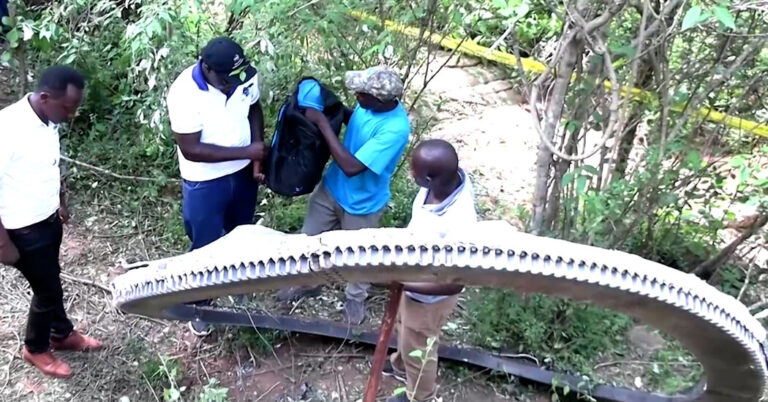A glowing ring of metal, more than eight feet in diameter and weighing more than 1,100 pounds, fell from the sky and crash landed in a remote village in Kenya this week, causing no injuries but frightening residents who feared a bomb or worse.
The object turned out to be space debris — junk left over from six decades of space exploration and a growing number of commercial launches, the Kenya Space Agency said Wednesday. It identified the object as a separation ring from a launch rocket and said that it was investigating the ring’s origin and ownership.
“Such objects are usually designed to burn up as they re-enter the Earth’s atmosphere or to fall over unoccupied areas, such as the oceans,” the space agency said, describing the incident as “an isolated case.”
For residents of Makueni County, southeast of Kenya’s capital Nairobi, the space junk’s landing was quite a shock on an otherwise quiet Monday afternoon.
“I was looking after my cow and I heard a loud bang,” Joseph Mutua, a local resident, told Kenya’s NTV news channel. “I looked around; I could not see any smoke in the clouds. I went by the roadside to check if there was any car accident, but there wasn’t any collision.”
Then Mr. Mutua and his neighbors looked up and saw a large circular object slowly falling from the sky. It resembled a giant car steering wheel and glowed red as it fell, some residents said. It cooled to gray after landing in a thicket, flattening trees and bushes, according to television news footage.
“If the object fell on a homestead, it would have been catastrophic,” Mr. Mutua said. “We didn’t know if it was a bomb or whatever it was and it fell here.”
While the agency offered assurances that the ring, since removed, posed no threat, people living in Mukuku village were still angered by the intrusion from above.
“We want the owner of this land to be compensated,” Paul Musili, another resident, told television news stations. “Since this object fell, we have not been sleeping. Everyone is wondering what is going on.”
Major Aloyce Were of the Kenya Space Agency said that authorities were still assessing the extent of the damage to the area, its residents and their livestock.
Hours after the object landed, Maj. Were and his team went to the scene, where they met traumatized residents.
“Space is no longer as safe as we used to know it,” he said.
Space is getting crowded. Last year, the European Space Agency estimated that there were more than 14,000 tons of material in low Earth orbit. About a third of that is junk, according to Sara Webb, an astrophysicist at the Swinburne University of Technology in Melbourne, and her colleagues.
With about 110 new launches each year and at least 10 satellites or other objects a year breaking into smaller fragments, the amount will continue to increase, the space agency said. And more of these objects are falling back down to Earth, without breaking up on re-entry as they are expected to.
Last March, a 1.6-pound chunk of debris from the International Space Station tore a hole through the roof of a home in Florida, and the following month, several sizable fragments of metal from a SpaceX capsule were found on a Canadian farm. A similar piece of metal, estimated to weigh about 100 pounds, was discovered in May at a camping site in North Carolina.
“We’ve reached this point in our exploration and use of space where this isn’t just something that happens once in a blue moon,” Dr. Webb said. “It is now almost every month or two.”
While the size of the debris that fell over Kenya was exceptional, there are at least 40,500 objects larger than 4 inches still in orbit, and millions of smaller pieces. Even these fragments could cause catastrophic damage if they collide with larger objects, like a satellite, which in turn creates more debris that could hit even more objects creating a cascading event known as Kessler Syndrome, Dr. Webb said.
Holding a company or country accountable for the fall in Kenya could prove difficult, Dr. Webb added. The U.S. Federal Communications Commission issued its first fine over space debris in 2023 — $150,000 to Dish, the television provider.
While there are international guidelines in place to reduce space debris, those measures, created in the early 2000s, have not kept up with the rate of launches, said Stijn Lemmens, a senior space debris mitigation analyst for the European Space Agency.
“Our concern is that because the uptake of countermeasures is slow at the moment, the problem grows faster,” Mr. Lemmens said.
A part of the solution is to make sure that rockets, satellites and other space vehicles are designed with a shorter life span and the capability to remove themselves from orbit safely, Mr. Lemmens said. Older rockets are being monitored to prepare for their re-entry, he added. Reducing space debris also requires a “mentality change,” Mr. Lemmens said, so that humans regard space as a finite resource, and not “where we can just dump stuff.”
Jimmy Gitaka contributed reporting from Eldoret, Kenya. Katrina Miller contributed reporting from Chicago.



